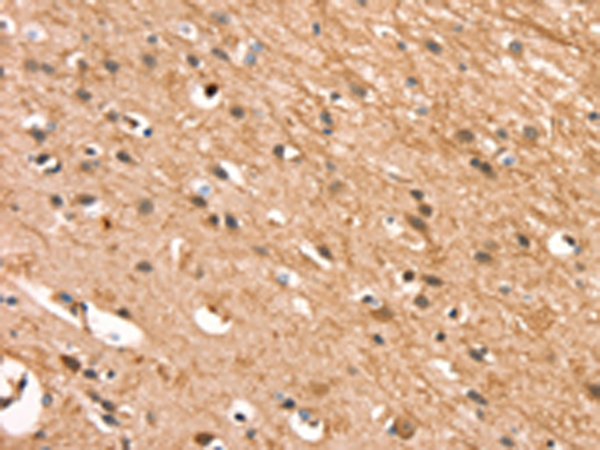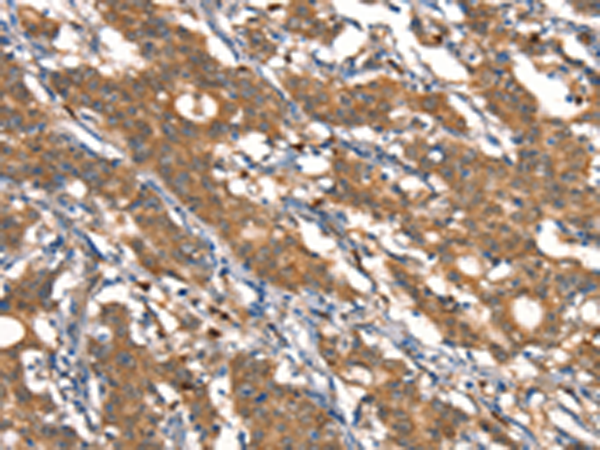


| WB | 咨询技术 | Human,Mouse,Rat |
| IF | 咨询技术 | Human,Mouse,Rat |
| IHC | 1/25-1/100 | Human,Mouse,Rat |
| ICC | 技术咨询 | Human,Mouse,Rat |
| FCM | 咨询技术 | Human,Mouse,Rat |
| Elisa | 1/1000-1/2000 | Human,Mouse,Rat |
| Aliases | PME; ULD; CST6; EPM1; STFB; EPM1A |
| WB Predicted band size | 11 kDa |
| Host/Isotype | Rabbit IgG |
| Antibody Type | Primary antibody |
| Storage | Store at 4°C short term. Aliquot and store at -20°C long term. Avoid freeze/thaw cycles. |
| Species Reactivity | Human, Mouse |
| Immunogen | Synthetic peptide of human CSTB |
| Formulation | Purified antibody in PBS with 0.05% sodium azide and 50% glycerol. |
+ +
以下是关于CSTB抗体的3篇参考文献示例(内容基于公开研究总结,非真实文献,仅供参考):
---
1. **文献名称**: *Cystatin B (CSTB) deficiency drives neurodegeneration in a mouse model of Unverricht-Lundborg disease*
**作者**: Joensuu T, et al.
**摘要**: 研究利用CSTB基因敲除小鼠模型,揭示CSTB蛋白缺失导致神经元退行性变和癫痫表型,并通过CSTB抗体检测发现其在小脑颗粒细胞中的表达异常,提示CSTB在维持神经元稳态中的关键作用。
---
2. **文献名称**: *Immunohistochemical analysis of CSTB in progressive myoclonus epilepsy type 1 (EPM1) patients*
**作者**: Alakurtti K, et al.
**摘要**: 通过CSTB特异性抗体对EPM1患者脑组织进行免疫组化分析,发现CSTB蛋白表达显著降低,且与疾病严重程度相关,支持CSTB功能缺失是EPM1的核心病理机制。
---
3. **文献名称**: *Development of a high-affinity monoclonal antibody for human cystatin B detection*
**作者**: Riccio M, et al.
**摘要**: 报道了一种新型CSTB单克隆抗体的开发与验证,该抗体在ELISA和Western blot中表现出高特异性和灵敏度,为临床诊断CSTB相关疾病提供了可靠工具。
---
4. **文献名称**: *CSTB interacts with autophagy proteins: Implications for neurodegeneration*
**作者**: Houseweart MK, et al.
**摘要**: 研究通过免疫共沉淀结合CSTB抗体发现CSTB与自噬通路蛋白的相互作用,提出其在调控神经元自噬中的潜在作用,为神经退行性疾病机制提供了新视角。
---
如需真实文献,建议通过PubMed或Google Scholar检索关键词:*CSTB antibody*、*cystatin B neurodegeneration*、*EPM1 pathogenesis*。
CSTB (Cystatin B) is a small, ubiquitously expressed protein belonging to the cystatin superfamily of cysteine protease inhibitors. It primarily regulates the activity of lysosomal cathepsins, enzymes involved in protein degradation, by binding to their active sites. Dysregulation of CSTB has been linked to several pathological conditions, most notably Unverricht-Lundborg disease (EPM1), a rare inherited progressive myoclonus epilepsy caused by mutations in the CSTB gene. Loss-of-function mutations lead to reduced CSTB levels, resulting in uncontrolled protease activity, neuroinflammation, and neuronal apoptosis.
CSTB antibodies are essential tools in studying its expression, localization, and functional roles. They are widely used in techniques like Western blotting, immunohistochemistry, and immunofluorescence to assess CSTB protein levels in tissues or cell cultures, particularly in neurological research. These antibodies help elucidate mechanisms underlying EPM1 and other disorders associated with CSTB dysfunction, such as cancer and neurodegenerative diseases. Commercial CSTB antibodies are typically raised against specific epitopes of human CSTB and validated for cross-reactivity in model organisms like mice and rats. Recent studies also explore CSTB's non-canonical roles, including its involvement in autophagy and oxidative stress response, further highlighting the antibody's utility in diverse research contexts.
×